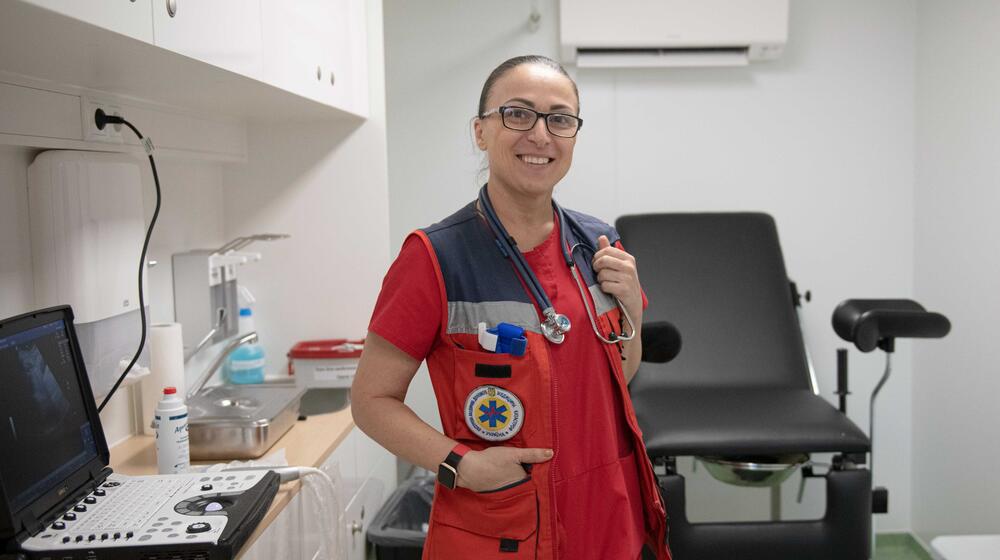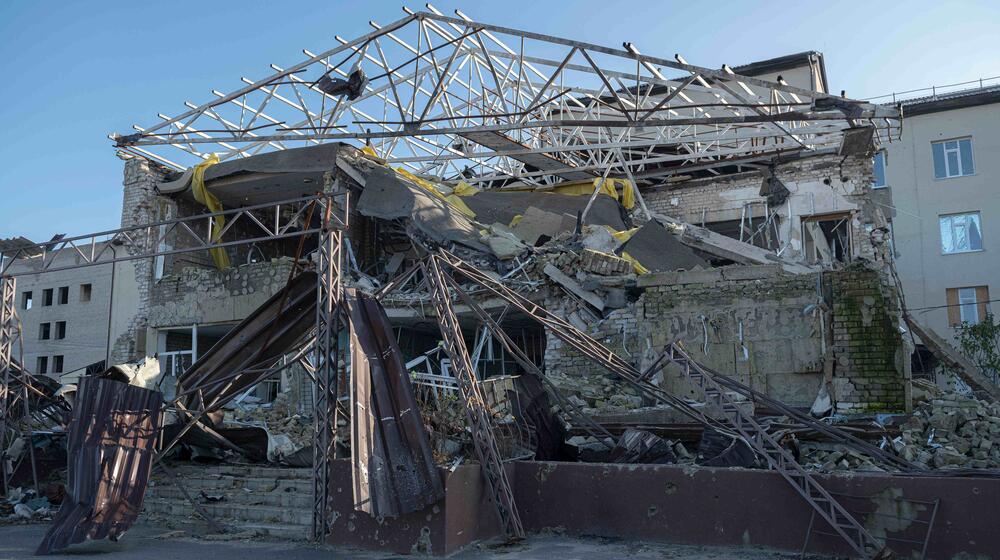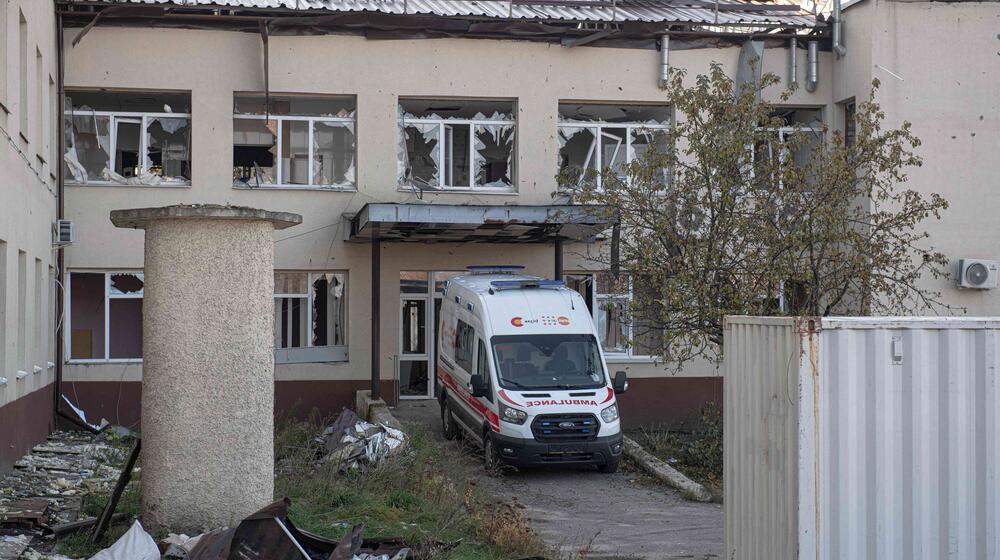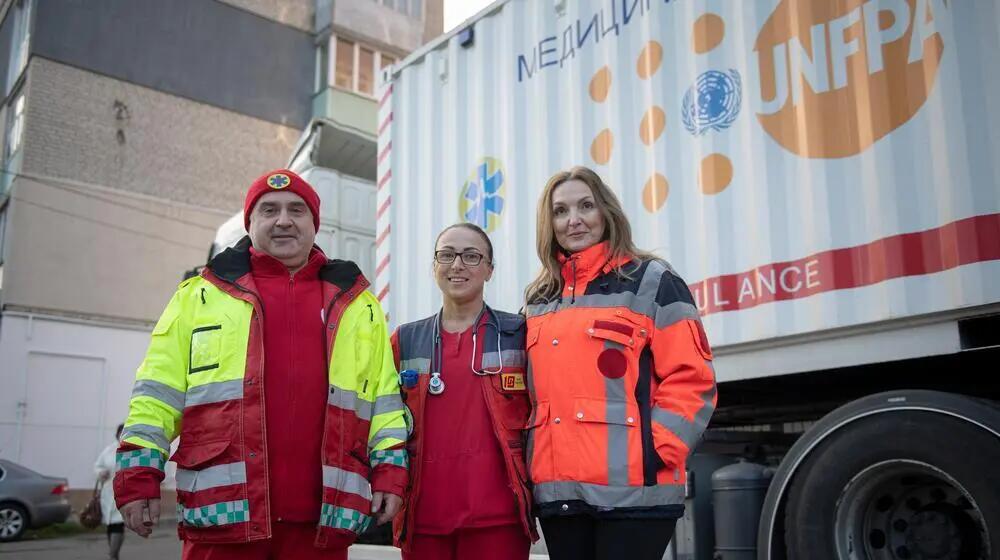BALAKLIYA, Ukraine – “When the war arrived in this area, the women and children tried to escape – from danger, hunger and the lack of medical services,” said Dr. Olga Filipova, an obstetrician and gynaecologist in Ukraine.
Dr. Filipova provides medical help for women in remote areas of the war-torn Kharkiv region. The team reaches them through a UNFPA mobile maternity unit currently stationed in the city of Balakliya, which was recently retaken from Russian forces. Although the shelling hasn’t stopped entirely, people are beginning to trickle back – many of them women and girls in dire need of health care.

“As the war rages on, this mobile unit is going to be very useful," explained Dr. Filipova. “Because even now that the government has regained control of the area and people are starting to return home, local medical facilities are still very low.”
Most health-care facilities and other essential infrastructure in the Kharkiv region have been destroyed, including a UNFPA-supported clinic in Izyum that previously served several surrounding communities. With services now concentrated in a vastly reduced number of health centres, for many the mobile unit is the only way they can receive urgent – and often life-saving – sexual and reproductive health support.
Fully autonomous and with access to their own electricity and water, in the mobile unit even complex procedures such as caesarian sections can be carried out under the harshest conditions. Staff work comfortably and with all necessary medicines and supplies so they can perform a wide range of examinations and help new mothers to give birth safely.
“We provide broad assistance, from general visits and basic analysis to consultations on family planning, contraception and referrals to specialists. Pregnant women and the most severe cases are referred to hospitals,” Dr. Filipova added.
Sharp increase in health risks and complications
The World Health Organization estimates that some 688 medical facilities have been attacked since the brutal war in Ukraine started nine months ago. Ongoing disruptions of power, water and heating and treacherous roads – many of them mined – are making it difficult to access or use those health services that are available, putting millions of lives at risk.

There are around 80,000 women of reproductive age in the retaken territories, of whom more than 100 are pregnant in the Kharkiv region and 70 are expected to give birth within the next three months.
“Many women – including pregnant women – haven’t received adequate medical assistance for months, nor did older people with chronic diseases. As a result we are seeing some severe complications among pregnant women and an exacerbation of clinical conditions,”said Dr. Filipova. The most common among these are cervical cancer, diabetes and sexually transmitted infections, including HIV.
Each patient requires support to address their particular needs, which UNFPA has continued to ensure by opening new health services and running psychosocial mobile teams and helplines for survivors of violence. Since March 2022, more than 10,000 women and girls have received sexual and reproductive health services from UNFPA-supported mobile clinics and some 33,000 had access to psychosocial services via helplines or mobile clinics.
Dangerous gaps in supplies and services

UNFPA will begin operating more than 30 mobile clinics across Ukraine in the coming weeks, to ensure thousands of women and girls receive the sexual and reproductive health support they need, including qualified birth assistance and post-natal care. An ambulance has also been handed over to the mobile team, which will work in the Kharkiv region and is based at the now destroyed hospital in Izyum.
But logistics and supply chains are still facing lengthy disruptions, and with insecurity obstructing delivery of even the most essential medical services, women and girls in Ukraine are facing unprecedented challenges.
Hundreds of thousands of isolated villages and towns have been cut off from power and communications infrastructure, meaning those living there are struggling to seek help as they most desperately need it.


